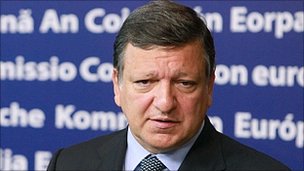 The European Commission President, Jose Manuel Barroso, has said unemployment is "still much too high" in the EU, in his first "state of the union" speech.
The European Commission President, Jose Manuel Barroso, has said unemployment is "still much too high" in the EU, in his first "state of the union" speech.
He used the format - made famous by US presidents - to outline the 27-nation EU's priorities.
The high-profile speech to Euro MPs in Strasbourg is seen as part of a drive to explain the importance of the EU's role in restoring economic growth.
He also reviewed the impact of the EU's landmark Lisbon Treaty.
Mr Barroso, in his second term as head of the EU's executive arm, said the recovery "is gathering pace, albeit unevenly within the union".
Earlier, political group leaders in the European Parliament had considered imposing fines on MEPs who failed to attend Mr Barroso's speech.
But the assembly's president, Jerzy Buzek, said more time was needed to decide how to beef up attendance in parliamentary debates.
The BBC's Europe correspondent Jonty Bloom in Strasbourg says Mr Barroso's speech may well be overshadowed by a meeting of Europe's finance ministers that will discuss the economic crisis and moves to regulate the banking industry.
Greece will learn if it has reformed enough to receive even more money from its neighbours and Europe's finance ministers will be discussing an EU-wide system of financial regulation designed to prevent another crisis.
The British financial services industry is worried that this will mean more red tape and a shift of power and influence away from the City of London towards continental Europe, our correspondent says.
Mr Barroso stressed that the internal market "is Europe's greatest asset, and we are not using it enough".
He said that in the areas of energy interconnections, research, and development aid "a euro spent at European level gets you more than a euro spent at national level".
But he said small and medium-sized businesses (SMEs) "are being strangled in regulatory knots".
"The Commission has put proposals on the table to generate annual savings of 38bn euros (£32bn) for European companies.
"Stimulating innovation, cutting red tape and developing a highly-skilled workforce: these are ways to ensure that European manufacturing continues to be world-class," he said.



